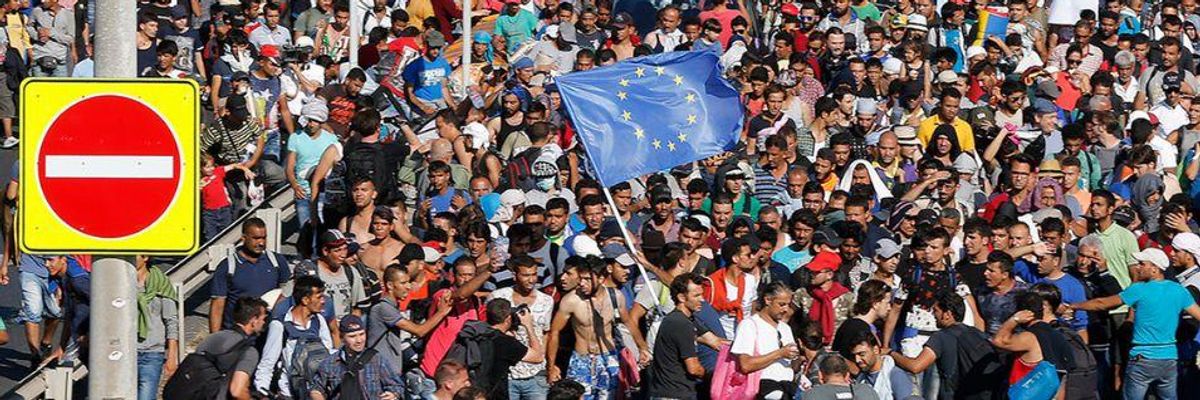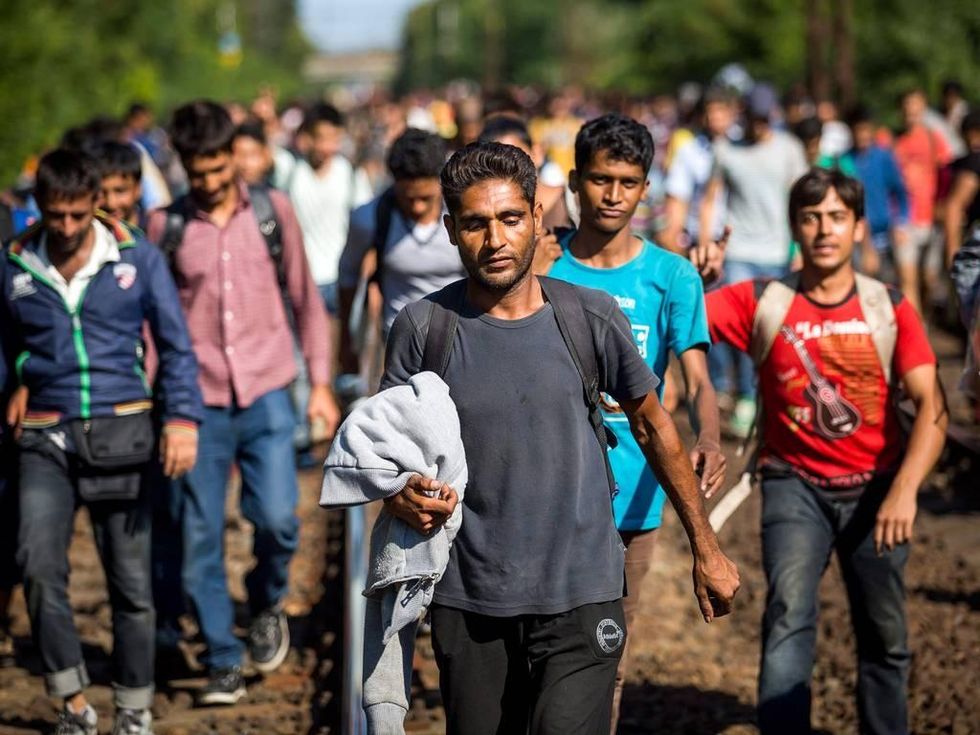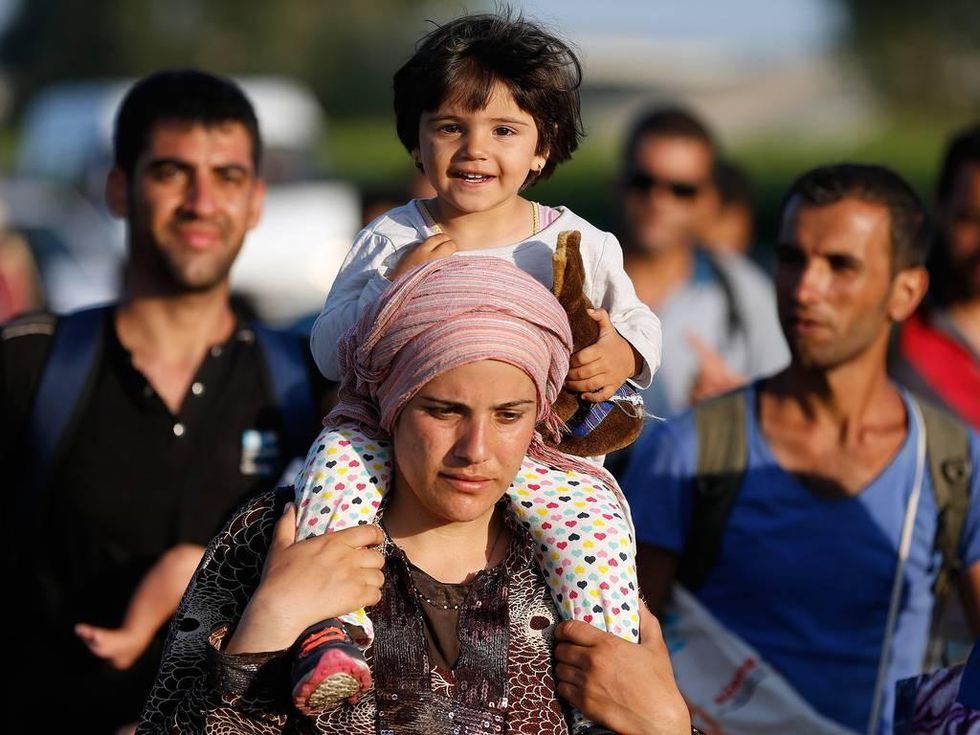

SUBSCRIBE TO OUR FREE NEWSLETTER
Daily news & progressive opinion—funded by the people, not the corporations—delivered straight to your inbox.
5
#000000
#FFFFFF
To donate by check, phone, or other method, see our More Ways to Give page.


Daily news & progressive opinion—funded by the people, not the corporations—delivered straight to your inbox.

Hundreds of refugees frustrated at being stuck at two train stations in Hungary set off on foot for Austria on Friday. (Photo: Frank Augstein/Associated Press)
No longer willing to wait for passage by train or official approval in Hungary, thousands of refugees from the Middle East and Africa--but mostly those fleeing war in Syria--undertook a dramatic 150-mile march from Budapest towards the Austrian border on Friday as they sought safety and relief from a treacherous journey that has now captured the attention of the world.
As the Associated Pressreports:
The moves for freedom came after Hungarian authorities spent days preventing thousands of refugees, many fleeing war in Syria, from boarding trains to Germany amid a surging number of desperate people from Asia, Africa and the Middle East seeking refuge in Europe.
Most hope to eventually reach Germany or elsewhere in the West and are trying to avoid registering in Hungary, which is economically depressed and more likely to return them to their home countries than many Western European nations. Under European law, asylum seekers will be approved or disapproved in the countries where they are first registered.

According to the UK Independent:
Frustrated by the lack of action, [the people] set off for Austria on foot, aiming to reach Germany. Amira's time in Hungary has shaken her belief in Europeans. "We don't trust them: they will take us to the camps and beat us," she says. "I hope that when the train comes it will take us away from here; that is all that I want."
Amira crossed four borders to get to Budapest during a harrowing journey that is becoming a rite of passage for thousands seeking a better life in Europe.
Some 200,000 people have crossed the sea between Turkey and Greece, paying hundreds of pounds to smugglers for a space on overcrowded dinghies. "It's the worst thing I have ever done in my life," says Mountaha, 23, who fled from Idlib in Syria. She and her husband, Anas, 24, a computer engineer, initially fled to Turkey. But after six months there they decided they wanted a better future for their son Mohamed, who is two months old.

The World Postadds:
Photographs of the march show children in strollers, elderly people in wheelchairs and people on crutches making the journey. The crowd broke through barricades that Hungarian authorities had set up outside Budapest, and chanted, "Germany, Germany," Reuters reports.
Also on Friday, Hungary closed one of its southern border crossings with neighboring Serbia after hundreds of people escaped from a nearby refugee camp. In the western Hungarian town of Bicske, hundreds of migrants refused to disembark from a train and transfer to a refugee camp. A Pakistani man reportedly died after falling on train tracks while escaping the Bicske train station.
In a surprise late announcement,according to AP, the Hungarian government announced it would offer buses to transport hundreds of migrants remaining in Budapest to the border with Austria.
In the United States, where criticism has focused on the inadequate response of the world's most "exceptional" nation, Democratic presidential candidate Martin O'Malley on Friday made a gesture of goodwill by declaring his support for a massive increase of refugees from Syria.
"I support the call from humanitarian and refugee organizations for the United States to accept at least 65,000 Syrian refugees next year," he said in a statement Friday. "If Germany --a country with one-fourth our population--can accept 800,000 refugees this year, certainly we--the nation of immigrants and refugees--can do more."
Having covered the developments of the refugee crisis in Europe throughout the day, the Guardian offered this latest rundown of developments as part of its comprehensive coverage:
Common Dreams is powered by optimists who believe in the power of informed and engaged citizens to ignite and enact change to make the world a better place. We're hundreds of thousands strong, but every single supporter makes the difference. Your contribution supports this bold media model—free, independent, and dedicated to reporting the facts every day. Stand with us in the fight for economic equality, social justice, human rights, and a more sustainable future. As a people-powered nonprofit news outlet, we cover the issues the corporate media never will. |
No longer willing to wait for passage by train or official approval in Hungary, thousands of refugees from the Middle East and Africa--but mostly those fleeing war in Syria--undertook a dramatic 150-mile march from Budapest towards the Austrian border on Friday as they sought safety and relief from a treacherous journey that has now captured the attention of the world.
As the Associated Pressreports:
The moves for freedom came after Hungarian authorities spent days preventing thousands of refugees, many fleeing war in Syria, from boarding trains to Germany amid a surging number of desperate people from Asia, Africa and the Middle East seeking refuge in Europe.
Most hope to eventually reach Germany or elsewhere in the West and are trying to avoid registering in Hungary, which is economically depressed and more likely to return them to their home countries than many Western European nations. Under European law, asylum seekers will be approved or disapproved in the countries where they are first registered.

According to the UK Independent:
Frustrated by the lack of action, [the people] set off for Austria on foot, aiming to reach Germany. Amira's time in Hungary has shaken her belief in Europeans. "We don't trust them: they will take us to the camps and beat us," she says. "I hope that when the train comes it will take us away from here; that is all that I want."
Amira crossed four borders to get to Budapest during a harrowing journey that is becoming a rite of passage for thousands seeking a better life in Europe.
Some 200,000 people have crossed the sea between Turkey and Greece, paying hundreds of pounds to smugglers for a space on overcrowded dinghies. "It's the worst thing I have ever done in my life," says Mountaha, 23, who fled from Idlib in Syria. She and her husband, Anas, 24, a computer engineer, initially fled to Turkey. But after six months there they decided they wanted a better future for their son Mohamed, who is two months old.

The World Postadds:
Photographs of the march show children in strollers, elderly people in wheelchairs and people on crutches making the journey. The crowd broke through barricades that Hungarian authorities had set up outside Budapest, and chanted, "Germany, Germany," Reuters reports.
Also on Friday, Hungary closed one of its southern border crossings with neighboring Serbia after hundreds of people escaped from a nearby refugee camp. In the western Hungarian town of Bicske, hundreds of migrants refused to disembark from a train and transfer to a refugee camp. A Pakistani man reportedly died after falling on train tracks while escaping the Bicske train station.
In a surprise late announcement,according to AP, the Hungarian government announced it would offer buses to transport hundreds of migrants remaining in Budapest to the border with Austria.
In the United States, where criticism has focused on the inadequate response of the world's most "exceptional" nation, Democratic presidential candidate Martin O'Malley on Friday made a gesture of goodwill by declaring his support for a massive increase of refugees from Syria.
"I support the call from humanitarian and refugee organizations for the United States to accept at least 65,000 Syrian refugees next year," he said in a statement Friday. "If Germany --a country with one-fourth our population--can accept 800,000 refugees this year, certainly we--the nation of immigrants and refugees--can do more."
Having covered the developments of the refugee crisis in Europe throughout the day, the Guardian offered this latest rundown of developments as part of its comprehensive coverage:
No longer willing to wait for passage by train or official approval in Hungary, thousands of refugees from the Middle East and Africa--but mostly those fleeing war in Syria--undertook a dramatic 150-mile march from Budapest towards the Austrian border on Friday as they sought safety and relief from a treacherous journey that has now captured the attention of the world.
As the Associated Pressreports:
The moves for freedom came after Hungarian authorities spent days preventing thousands of refugees, many fleeing war in Syria, from boarding trains to Germany amid a surging number of desperate people from Asia, Africa and the Middle East seeking refuge in Europe.
Most hope to eventually reach Germany or elsewhere in the West and are trying to avoid registering in Hungary, which is economically depressed and more likely to return them to their home countries than many Western European nations. Under European law, asylum seekers will be approved or disapproved in the countries where they are first registered.

According to the UK Independent:
Frustrated by the lack of action, [the people] set off for Austria on foot, aiming to reach Germany. Amira's time in Hungary has shaken her belief in Europeans. "We don't trust them: they will take us to the camps and beat us," she says. "I hope that when the train comes it will take us away from here; that is all that I want."
Amira crossed four borders to get to Budapest during a harrowing journey that is becoming a rite of passage for thousands seeking a better life in Europe.
Some 200,000 people have crossed the sea between Turkey and Greece, paying hundreds of pounds to smugglers for a space on overcrowded dinghies. "It's the worst thing I have ever done in my life," says Mountaha, 23, who fled from Idlib in Syria. She and her husband, Anas, 24, a computer engineer, initially fled to Turkey. But after six months there they decided they wanted a better future for their son Mohamed, who is two months old.

The World Postadds:
Photographs of the march show children in strollers, elderly people in wheelchairs and people on crutches making the journey. The crowd broke through barricades that Hungarian authorities had set up outside Budapest, and chanted, "Germany, Germany," Reuters reports.
Also on Friday, Hungary closed one of its southern border crossings with neighboring Serbia after hundreds of people escaped from a nearby refugee camp. In the western Hungarian town of Bicske, hundreds of migrants refused to disembark from a train and transfer to a refugee camp. A Pakistani man reportedly died after falling on train tracks while escaping the Bicske train station.
In a surprise late announcement,according to AP, the Hungarian government announced it would offer buses to transport hundreds of migrants remaining in Budapest to the border with Austria.
In the United States, where criticism has focused on the inadequate response of the world's most "exceptional" nation, Democratic presidential candidate Martin O'Malley on Friday made a gesture of goodwill by declaring his support for a massive increase of refugees from Syria.
"I support the call from humanitarian and refugee organizations for the United States to accept at least 65,000 Syrian refugees next year," he said in a statement Friday. "If Germany --a country with one-fourth our population--can accept 800,000 refugees this year, certainly we--the nation of immigrants and refugees--can do more."
Having covered the developments of the refugee crisis in Europe throughout the day, the Guardian offered this latest rundown of developments as part of its comprehensive coverage: